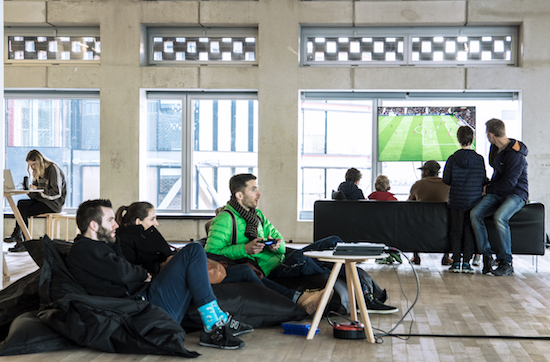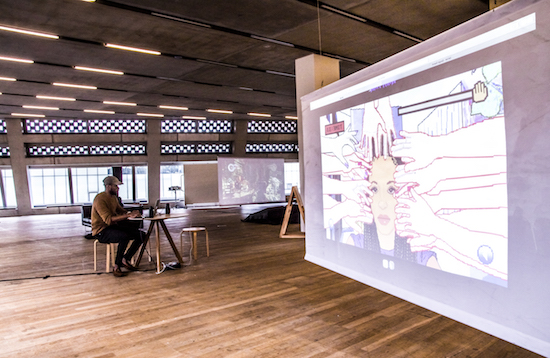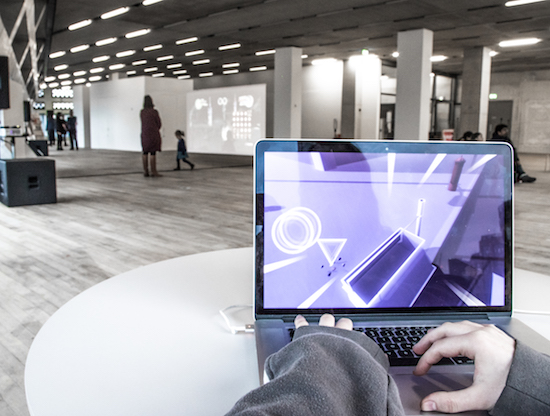all images credit: 40 Temps, 8 Days (2017), They Are Here Photo: Indre Neiberkaite
In Tate Exchange an array of video games are being played. This is one of a series of activities undertaken by forty temps hired through Tate’s own HR systems by They Are Here.
Through eight days of employment a series of leisure activities are undertaken by these workers. On each day the activity changes: chess is staged; the internet is browsed; ping pong is played; philosophy is discussed and music shared. For the casual visitor a room is encountered which is full of people playing games, sitting in the spaces by the windows and on the cushions on the floor. There are people engaging in discussion, laughing and charging their mobile phones and laptops from the plugs in the floor. The visitor may perceive a bending of the space, yet it is warm and convivial and full of activity. Some activities fit with the immediate context of Tate Exchange while others are more challenging. As much as surfing the internet feels benign, would you want anybody to see you doing it?
Prior to the opening of Tate Exchange to the public each morning, a daily conversation is held between They Are Here and five of the rotating workers employed in 40 Temps, 8 Days. The context of the day’s work is shaped, reflections on time and labour are discussed and the ways that they will engage with the project are shared. Mutual concerns are expressed and the voices of disparate individuals are brought together to reflect on their expectations of the day.
As the temps move out to occupy the gallery, they are undefined as such. They have no identification other than their proximity to the equipment used during the day. Without the identifiable branding of a lanyard, badge, or t-shirt, the temps are not immediately identifiable as employees; more individuals who happen to engage with civic space. This creates a charged dynamic for the visitor who shifts into being a participant. If a conversation is initiated, the question remains as to who it is being held with.
Present in 40 Temps, 8 Days is the slippage in the home/work/leisure/public/private space that our lives are subject to. There is an empathy to the blurring of the term “work” and how it leaks through our daily activities with the clicking of likes, emails sent during a commute, the borrowed broadband used to check for messages, the scanning of goods in a supermarket self-service checkout, and the payments for goods and services made on your mobile phone. These are momentary actions which accompany our contemporary work patterns and the drifting of body and mind into a place of constant entrepreneurial availability. Those fun days in an office in which it is inferred that you can move spontaneously from one place to another unencumbered by a desk or a boss. Workspaces in which anything is possible (if you have mobility, credit, and access to both physical and digital networks). A modern gig economy, defined by companies who wish to create a vocabulary to replace the specific term “employees” with the casual availability of “independent suppliers”.
On the day I attend 40 Temps, 8 Days, video games are being played in the gallery. I move from watching a temp engage with Sonic the Hedgehog on a laptop, to discussing work patterns and the curiosity that children have for the project. As we talk, Sonic falls off a cliff and I feel a pang of guilt for causing his demise. Videogame characters may have Lazarus-like abilities for recovery and retrieval, yet time is lost and movements are retraced. On another screen the game Hair Nah by Momo Pixel requires the participant to swat away the white hands that reach out to mindlessly touch black women’s hair. A group is gathering around the person playing it. You realise how easy it is to be assimilated into work as a spectacle.

In a different conversation, I end up recalling how many times we must have all driven Tommy Vercetti into the sea in a golf cart in Grand Theft Auto while having a temp’s friend explain to me how Fallout 4 was, without doubt, the worst Fallout game ever made. I watch the character he controls move through a post-apocalyptic landscape. Action gaming, for all of its boss fights, involves time where nothing happens until you reveal the clues. The comfort and intimacy of the gamers home-cocoon of snacks and sofas is starkly replaced with the environment of the gallery. My attention wanders and conversation becomes welcome.
There is an oddity here. This space full of unmediated mass culture taking place in the gallery without intervention, baggage, or literal artistic expression. Yet the gallery asserts its presence as an audience arrive at the other side of Tate Exchange for ‘Art Time, Life Time: Tehching Hsieh’
The talk is taking place as part of Time Well Spent project with Taiwanese performance artist Tehching Hsieh, Lois Keidan, co-founder and co-director of the Live Art Development Agency, and critic & curator Amelia Groom. Hsieh spoke of the demands of the years of continuous durational practice that formed his works including One Year Performance (1980–81), during which the artist locked himself for 365 days in a 3.5 by 2.7 by 2.4 m wooden cage, as “doing time”: “It’s not about survival; it is survival. It’s not about labour; it is labour. It’s not about time; it is time”.
With these statements, Hsieh revealed the connection of One Year Performance to 40 Temps, 8 Days. While the talk took place, the temps continued to work within Tate Exchange, providing emotional labour regardless of our participation. Here the nine-to-five of the quotidian working day is replaced the with the twenty-four-seven of our present, one in which the constant availability of the working body is required.
When our time is so malleable when does work end?
What work would we make if we documented each piece of data we are mined for? What circumstances would occur if we tracked our movements in the world from place to place and from this calculated the value of our daily work?
We’ve already done so by opening up our lives to the constant flow of Uberisation. Within this contemporary zone, much can be learned from the consistent adaptability of artists who balance precarious work patterns with the desire to negotiate a freer place from which to operate. Consider the power held in communication, how transitional spaces of kinship can be made from loose allegiances forged in public. Meeting points in which you strike up conversations that blur the delineations between the act of work and the purpose of leisure. It is in our engagement with these moments that They Are Here’s 40 Temps, 8 Days seeks to create agency. The temps are collaborators not subjects. The complexities of their professional lives are discussed alongside the artists own. Through this, a network is created that exists beyond the hours spent in the gallery.

There is a common mood that manifests towards the end of the working day, in those minutes prior to release from the workplace. A restlessness occurs, as the claim that a job has on you becomes lessened, and the external world beckons. As the view from the windows of Tate Exchange changes to sunset, a new dynamic occurs in the room. There is a merging in the reflections held in the galleries’ windows, of the flats, shops, and cafes outside it, that speaks of the modern city. Present also is the overlap of personal and private spaces with the audience, temps, and the artists in 40 Temps, 8 Days that echoes the staff and audience interaction present in Tate’s galleries and gift shops.
“With work tied so tightly into our identities,” Nick Srnicek writes in Inventing the Future: Postcapitalism and a World Without Work, “overcoming the work ethic will require us overcoming ourselves.”
You wonder where the temps that perform the work are bound after they finish discussing the day’s events with They Are Here. You remain curious to the content of these daily conversations and wonder if their working day has ended, or if another role in a different workplace is being logged on to? They Are Here’s focus on precarity and the value of working time in 40 Temps, 8 Days holds truths that are as applicable to the artists as they are to the temps and participants. As work blurs the public and private space in our lives, to disavow it and learn to play on our own terms within the workplace is a necessary act.
40 Temps, 8 Days is at Tate Exchange every weekend from 30 November to 10 December


